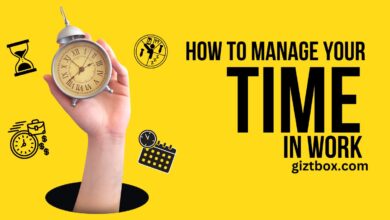how to become professional in Communication skills

Effective communication is key to doing well at work. This guide will show you how to get better at talking and listening. You’ll learn to speak clearly and make a strong impact at work and in life.
Key Takeaways
- Understand the importance of effective communication in the workplace
- Learn techniques to enhance productivity and build strong professional relationships
- Develop active listening skills as the foundation of effective communication
- Master verbal communication skills, including clarity, conciseness, and tone adaptation
- Recognize the significance of nonverbal communication and body language
Importance of Effective Communication in the Workplace
Effective communication is key to a successful workplace. It’s the base of strong professional relationships and boosts productivity. When communication is strong, it brings many benefits to employees, teams, and the company.
Enhancing Productivity and Collaboration
Clear communication helps team members work well together. They can coordinate tasks and stay on the same page. This makes workplace communication important for breaking down barriers and promoting team collaboration. It lets employees work more efficiently and effectively.
Building Strong Professional Relationships
Good communication in the workplace is vital for strong professional relationships. When people can share ideas, give feedback, and solve problems together, trust and respect grow. This creates a positive work environment.
Improving communication skills helps people influence, persuade, and work better with others. This leads to personal growth and helps the company succeed.
Active Listening: The Foundation of Effective Communication
Effective communication is key to professional success. Active listening is the base of this. It means fully engaging with the speaker, understanding their message, and showing you’re paying attention. By getting good at active listening, you can boost your interpersonal communication. This leads to better and more meaningful talks with colleagues, clients, and others.
Active listening means being fully present, focused, and ready to respond. It’s more than just hearing words. It’s about really getting the speaker’s message, feelings, and what they mean. By listening well, you can learn a lot, build trust, and work better with others.
- Maintain eye contact and avoid distractions to show your focus and engagement.
- Paraphrase or summarize the speaker’s main points to demonstrate your understanding.
- Ask clarifying questions to ensure you have captured the complete message.
- Respond with empathy and understanding, acknowledging the speaker’s perspective.
Getting better at active listening takes time, but it’s worth it. Being more attentive and engaged can improve your communication skills. This can make your work relationships stronger, leading to more success at work.
| Active Listening Techniques | Benefits |
|---|---|
| Maintain eye contact and avoid distractions | Demonstrates focus and engagement |
| Paraphrase or summarize the speaker’s main points | Shows your understanding of the message |
| Ask clarifying questions | Ensures complete comprehension |
| Respond with empathy and understanding | Builds trust and strengthens relationships |
Putting active listening first in your communication skills can make your work interactions better. It helps with interpersonal communication and sets the stage for success at work.
Mastering Verbal Communication Skills
Effective verbal communication is key to professional success. It matters whether you’re giving a presentation, in a meeting, or talking one-on-one. Improving your speaking skills can boost your communication skills and help your career grow. We’ll look at ways to make your communication clear, brief, and flexible.
Clarity and Conciseness in Speaking
To speak well, be clear and brief. Don’t talk too much or use hard words that confuse people. Think clearly, use easy language, and stick to the main points. This way, people will understand you better and remember what you said.
Adapting Your Tone and Language
Being good at professional communication means changing your tone and words for different situations and people. With coworkers, you might speak more casually. But in a formal setting, you should sound more professional. Watch how your audience reacts and change how you talk to make sure they get your message.
Getting better at verbal communication will improve your professional communication skills. It will help you make stronger connections, have more influence, and move forward in your career.
Nonverbal Communication: Reading Body Language
Communication goes way beyond just words. Nonverbal cues like body language and facial expressions tell us a lot about someone’s feelings and thoughts. Learning to read these cues can change the game at work. It helps you understand people better and make a bigger impact.
Understanding Facial Expressions and Gestures
Facial expressions are full of hidden messages. A smile shows you’re friendly and excited, while a furrowed brow means you might be confused. Gestures like crossed arms or fidgeting show how someone feels inside. By paying attention to these, you can get a better sense of what others are thinking.
| Facial Expression | Potential Meaning |
|---|---|
| Furrowed Brow | Concentration, Confusion, Skepticism |
| Raised Eyebrows | Surprise, Interest, Curiosity |
| Tight Lips | Displeasure, Disapproval, Tension |
| Genuine Smile | Happiness, Friendliness, Engagement |
Getting better at noticing these nonverbal signals can boost your communication skills. It helps you connect better with others at work. Remember, nonverbal communication and body language are key to doing well at work. Learning them can really set you apart in your career.
How to Become Professional in Communication Skills
Improving your communication skills is key for career growth and success at work. To get better at professional communication, you need to practice often, know yourself, and always want to get better. We’ll look at the main steps to boost your communication skills.
- Assess Your Current Communication Skills: Start by checking your good points and what you need to work on. Look at how you listen, speak, use nonverbal cues, and write. Knowing what you need to improve will help you focus on getting better.
- Develop Active Listening Habits: Being a good listener is the base of good communication skills. Practice paying full attention to others, asking questions to clarify, and repeating back what you heard to make sure you get it.
- Improve Verbal Communication: Work on speaking clearly and with confidence. Notice how you sound, your body language, and how you adjust your words for different people and situations.
- Enhance Written Communication: Get better at writing clearly and professionally. Improve your email skills and learn to write good reports, proposals, and other documents.
- Seek Feedback and Mentorship: Talk to coworkers, bosses, or experts who can give you helpful advice on your communication skills. Look for a mentor who can help you improve in communication.
- Continuously Expand Your Knowledge: Keep up with the latest in workplace communication. Go to workshops, read articles, and take part in learning chances to get better at communication skills.
By using these steps regularly, you can get the professional communication skills you need to do well in your job and work well with others.
Developing Written Communication Proficiency
In the professional world, effective written communication is key. It’s important to write clear and concise emails and documents. This section will show you how to improve your writing skills. It will help you make your messages professional, impactful, and clear.
Crafting Clear and Concise Emails
Email is the main way we communicate at work. Learning how to write good emails is crucial. Keep your emails clear and concise. Use a professional tone and avoid hard words or unclear language.
Make sure your subject lines tell what your email is about. Your emails should have a clear goal, a logical order, and a call-to-action.
Mastering Professional Writing Techniques
Writing well is more than just sending emails. When you’re writing reports, proposals, or other business documents, use techniques that make your writing clear and effective. This means organizing your thoughts, using the active voice, and keeping a formal style.
Also, proofread and edit your work to fix any mistakes. This ensures your writing is polished and professional.
Improving your communication skills in writing helps you share your ideas, work with colleagues, and make a strong impression at work.
Overcoming Communication Barriers
Good communication is key to a successful work relationship. But, it can face challenges like cultural differences and language barriers. We’ll look at ways to tackle these issues. This will help you talk better with people from different backgrounds.
Cultural Differences and Language Barriers
In intercultural communication, it’s key to understand cultural differences. These can affect how people see, understand, and react to info. Things like body language and eye contact mean different things in different cultures.
Language barriers can also cause confusion, making it hard to share ideas clearly.
- Recognize and appreciate cultural diversity within your organization.
- Familiarize yourself with common cultural norms and communication styles in your industry.
- Encourage open dialogue and create opportunities for cross-cultural learning and exchange.
- Invest in language training or translation services to bridge language barriers and facilitate communication barriers.
By tackling cultural differences and language barriers, you can build trust and respect. This makes intercultural communication better and boosts work performance.
Effective Presentation and Public Speaking Skills
Being good at giving presentations and speaking in public is key for growing in your career and improving how you communicate. Whether it’s a small team meeting or a big conference, these skills can really help you stand out. They can boost your career and how well you connect with others.
Speaking well in public is more than just sharing facts. It’s about catching your audience’s attention, making your message clear and passionate, and leaving a mark. By improving your presentation skills and public speaking skills, you can become a strong communicator. You’ll get people’s attention and motivate them to act.
Strategies for Impactful Presentations
Creating a great presentation takes a lot of thought. Here are some important tips:
- Start with a strong opening: Catch your audience’s eye right away with something interesting or a question that makes them think.
- Use visual aids well: Add slides, images, or videos to make your message stronger and keep everyone interested.
- Practice a lot: Rehearse your presentation to make sure it flows well, you speak confidently, and you move smoothly from one point to the next.
- Get your audience involved: Ask questions, use polls, or invite discussion to make your presentation more lively and engaging.
- End with something memorable: Finish with a clear call to action or a statement that sticks with your audience long after you’re done.
Mastering the Art of Public Speaking
Speaking in public can be scary, but with the right attitude and skills, it can also be a great chance to grow professionally. Here are some tips to help you speak in public with confidence and make an impact:
- See your nerves as excitement: Use your pre-presentation jitters to fuel your energy and enthusiasm.
- Focus on your audience: Instead of worrying about how you’re doing, connect with the people listening to you.
- Be confident and real: Stand up straight, look people in the eye, and let your true self show.
- Listen actively: Pay attention to what your audience says and responds to their questions and feedback.
- Always look for ways to get better: Ask for feedback and be open to learning and improving as a speaker.
Remember, being good at public speaking and presentations is not just about sharing information. It’s about connecting with your audience, inspiring them, and making a lasting impression. By getting better at these communication skills, you can take your professional development to the next level. You’ll become a confident, influential speaker in any situation.
Interpersonal Communication and Conflict Resolution
Effective communication is key in work relationships and solving conflicts. This part will teach you how to stay calm and talk well in tough times. You’ll learn to find good solutions and build stronger work connections.
Maintaining Composure in Challenging Situations
Dealing with work conflicts or tense talks is hard, but keeping calm is crucial. It’s a key skill for communication skills and problem-solving. By staying calm, you can think clearly and talk openly, making interpersonal communication better.
Here are some tips for staying calm in tough times:
- Take a deep breath: Pause and take a few deep breaths to center yourself before responding.
- Listen actively: Focus on understanding the other person’s perspective and concerns, rather than formulating your own response.
- Speak slowly and clearly: Use a measured tone and avoid interrupting or raising your voice.
- Suggest a break: If tensions escalate, politely propose taking a short break to regain composure.
- Seek common ground: Identify areas of agreement and focus on finding mutually beneficial solutions.
By staying calm and solving conflicts constructively, you can handle tough situations with professionalism. This will improve your interpersonal communication skills.
Continuous Improvement and Feedback
Becoming a pro in communication skills is a journey that never stops. It takes dedication to keep getting better and a readiness to learn from others. It’s key to listen to feedback and keep learning throughout your career.
Seeking Constructive Criticism
Getting feedback from others can show you what you’re good at and where you can get better. Don’t see criticism as a personal attack. Instead, see it as a chance to grow. Always ask for feedback and use it to find ways to improve your communication skills improvement.
Embracing Lifelong Learning
Communication skills don’t stay the same; they need to keep getting better. Adopt a mindset of lifelong learning by looking for ways to grow professionally. This could be through workshops, training, or online courses. Keep up with new trends and try out new ways to communicate to boost your professional development.
| Strategies for Continuous Improvement | Benefits |
|---|---|
|
|
By always looking to get better and listening to others, you can really improve your communication skills. This will make you a top-notch communication professional.
Conclusion
Improving your communication skills is key to growing both personally and professionally. This guide has shown you how to talk better, build stronger relationships, and succeed in your career. Remember, getting better at communication is a journey that never ends. Keep working on your skills.
This guide has given you the tools to improve your communication skills, boost your professional development, and move forward in your career success. By using active listening, improving how you speak and show feelings, and getting better at writing, you’re on your way to being a great communicator.
Keep learning and growing, and always look for ways to get better at communicating. With hard work and a desire to improve, you’ll handle work situations smoothly, make lasting connections, and find new paths to success. Start this journey with excitement, and let your better communication skills lead you to more achievements in your career and life.
FAQ
What are the key components of effective communication in the workplace?
Key components include active listening, clear speaking, strong writing skills, and nonverbal awareness. It also means overcoming barriers like cultural and language differences.
How can active listening improve professional relationships?
Active listening means fully engaging with what others say. It helps you understand colleagues, clients, and stakeholders better. This leads to more productive talks and stronger relationships.
What are some strategies for enhancing verbal communication skills?
To improve verbal skills, speak clearly and briefly. Adjust your tone and language for different people and situations. Also, work on your public speaking and presentations.
How can understanding nonverbal communication improve professional interactions?
Understanding nonverbal cues like body language and facial expressions gives you deeper insights. It helps you adjust your nonverbal signals for a stronger professional image.
What steps can I take to develop professional-level communication skills?
To improve, practice regularly and know yourself well. Seek feedback, keep learning, and work on your writing, speaking, and handling conflicts.
How can I overcome communication barriers in a diverse workplace?
To overcome barriers, understand and adapt to cultural differences. Learn to communicate well across languages. Also, be empathetic and sensitive to cultures to make communication more inclusive.
What role does continuous improvement and feedback play in enhancing communication skills?
Continuous improvement and feedback are key to better communication skills. Seek constructive criticism, use feedback, and keep an open mind to improve and adapt to new communication needs.




